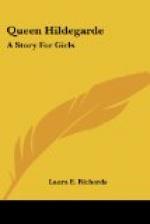Presently the boy raised his head and cried joyfully, “I’ve fetched him, Miss Hildy! I know it, now, jest like pie!” Whereupon he stood up, and assuming a military attitude, submitted to a severe geographical catechising, and came off with flying colors.
“That was a very good recitation,” said Hilda, approvingly, as she laid the book down. “You shall have another ballad to-day as a reward. But, Bubble,” she added, rather seriously, “I do wish you would not use so much slang. It is so senseless! Now what did you mean by saying ’just like pie,’ in speaking of your lesson just now?”
“Oh! come now, Miss Hildy!” said Bubble, bashfully, “the’ ain’t no use in your tellin’ me you don’t know what pie is.”
“Of course I know what pie is, you silly boy!” said Hilda, laughing. “But what has pie to do with your geography lesson?”
“That’s so!” murmured the boy, apologetically. “That’s a fact, ain’t it! I won’t say ‘like pie’ no more; I’ll say ‘like blazes,’ instead.”
“You needn’t say ‘like’ anything!” cried Hilda, laughing again; “just say, I know my lesson ‘well,’ or ‘thoroughly.’ There are plenty of real words, Bubble, that have as much meaning as the slang ones, and often a great deal more.”
“That’s so,” said Bubble, with an air of deep conviction. “I’ll try not to talk no more slang, Miss Hildy. I will, I swan!”
“But, Bubble, you must not say ‘I swan’ either; that is abominable slang.”
Bubble looked very blank. “Why, what shall I say?” he asked, simply. “Pink won’t let me say ‘I swow,’ ‘cause it’s vulgar; an’ if I say ‘by’ anything, Ma says it’s swearin’,—an’ I can’t swear, nohow!”
“Of course not,” said Hilda. “But why must you say anything, Bubble,—anything of that sort, I mean?”
“Oh!” said the boy, “I d’ ’no ’s I kin say ezackly why, Miss Hildy; but—but—wal, I swan! I mean, I—I don’t mean I swan—but—there now! You see how ’tis, Miss Hildy. Things don’t seem to hev no taste to ’em, without you say somethin’.”
“Let me think,” said Hilda. “Perhaps I can think of something that will sound better.”
“I might say, ‘Gee Whittekers!’” suggested Bubble, brightening up a little. “I know some fellers as says that.”
“I don’t think that would do,” replied Hilda, decidedly. “What does it mean?”
“Don’t mean nothing as I knows on,” said the boy; “but it sounds kind o’ hahnsome, don’t it?”
Hilda shook her head with a smile. She did not think “Gee Whittekers” a “hahnsome” expression.
“Bubble,” she said after a few moments’ reflection, during which her scholar watched her anxiously, “I have an idea. If you must say ‘something,’ beside what you actually have to say, let it be something that will remind you of your lessons; then it may help you to remember them. Instead of Gee—what is it?—Gee Whittekers, say Geography, or Spelling, or Arithmetic; and instead of ‘I swan,’ say ‘I study!’ What do you think of this plan?”




